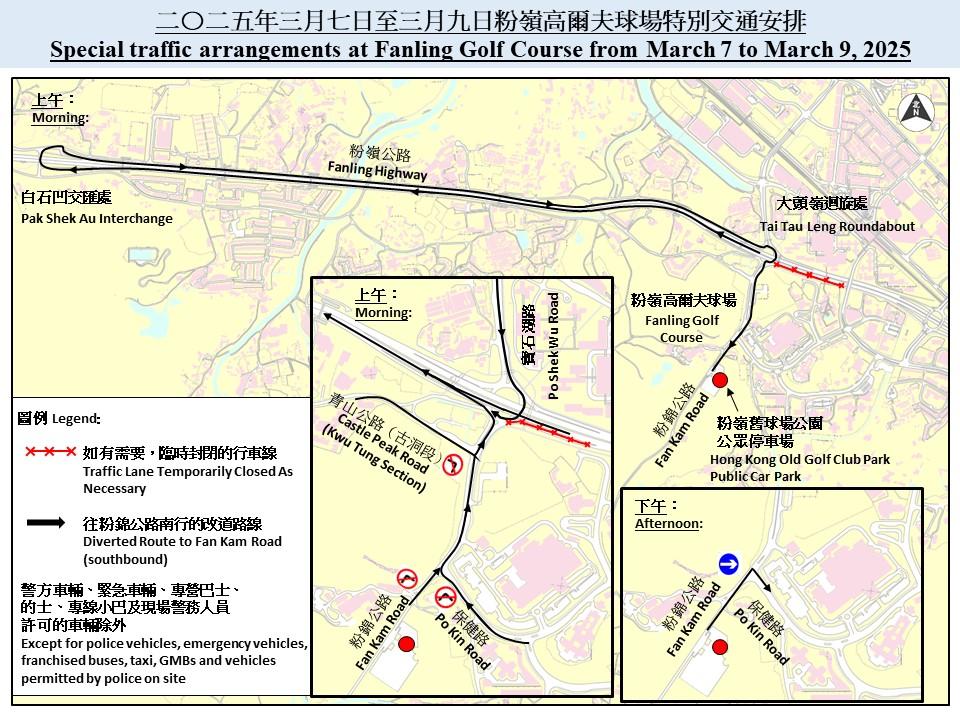Statistics on vessels, port cargo and containers for the fourth quarter of 2024
The Census and Statistics Department (C&SD) today (March 4) released the statistics on vessels, port cargo and containers for the fourth quarter of 2024.
In the fourth quarter of 2024, total port cargo throughput increased by 1.1% to 44.3 million tonnes over a year earlier. Within this total, inward port cargo decreased by 3.5% to 27.3 million tonnes, while outward port cargo increased by 9.6% to 17.1 million tonnes.
For 2024 as a whole, total port cargo throughput increased by 1.0% to 176.7 million tonnes over a year earlier. Within this total, inward port cargo decreased by 0.5% to 111.1 million tonnes, while outward port cargo increased by 3.9% to 65.6 million tonnes.
On a seasonally adjusted quarter-to-quarter comparison, total port cargo throughput increased by 2.4% in the fourth quarter of 2024. Within this total, inward port cargo decreased by 1.4% compared with the preceding quarter, while outward port cargo increased by 8.9% compared with the preceding quarter. The seasonally adjusted series enables more meaningful shorter-term comparison to be made for discerning possible variations in trends.
Port cargo
In the fourth quarter of 2024, within port cargo, seaborne cargo decreased by 1.8% to 27.8 million tonnes over a year earlier, while river cargo increased by 6.5% to 16.5 million tonnes over a year earlier.
In the whole year of 2024, within port cargo, seaborne cargo decreased by 4.1% to 110.5 million tonnes over a year earlier, while river cargo increased by 10.9% to 66.2 million tonnes over a year earlier.
Comparing the fourth quarter of 2024 with a year earlier, double-digit increases were recorded in the tonnage of inward port cargo loaded in Korea (+43.4%) and Singapore (+18.3%). On the other hand, double-digit decreases were recorded in the tonnage of inward port cargo loaded in Indonesia (-42.5%), the United States of America (-31.5%), Malaysia (-24.1%), Thailand (-20.6%), Vietnam (-17.7%) and Japan (-13.1%). For outward port cargo, double-digit increases were recorded in the tonnage of outward port cargo discharged in Taiwan (+29.9%), Vietnam (+21.6%), the mainland of China (+21.4%) and Korea (+20.3%). On the other hand, double-digit decreases were recorded in the tonnage of outward port cargo discharged in the Philippines (-49.0%), Malaysia (-21.9%), Japan (-17.6%) and the United States of America (-12.1%).
Comparing the whole year of 2024 with a year earlier, double-digit increases were recorded in the tonnage of inward port cargo loaded in Korea (+29.4%) and Singapore (+21.4%). On the other hand, double-digit decreases were recorded in the tonnage of inward port cargo loaded in the United States of America (-27.5%), Indonesia (-26.9%), Malaysia (-21.0%), Vietnam (-18.3%), Thailand (-16.0%) and Japan (-15.8%). For outward port cargo, double-digit increases were recorded in the tonnage of outward port cargo discharged in Vietnam (+15.3%), the mainland of China (+12.6%) and Taiwan (+11.5%). On the other hand, double-digit decreases were recorded in the tonnage of outward port cargo discharged in the Philippines (-32.2%), Japan (-19.2%), Malaysia (-16.0%), Thailand (-13.4%) and the United States of America (-10.9%).
Comparing the fourth quarter of 2024 with a year earlier, double-digit changes were recorded in the tonnage of inward port cargo of "metalliferous ores and metal scrap" (+26.3%), "petroleum, petroleum products and related materials" (+22.8%), "artificial resins and plastic materials" (-10.1%), "stone, sand and gravel" (-13.2%) and "coal, coke and briquettes" (-48.2%). As for outward port cargo, triple-digit or double-digit increases were recorded in the tonnage of "stone, sand and gravel" (+169.0%), "metalliferous ores and metal scrap" (+30.1%) and "live animals chiefly for food and edible animal products" (+11.8%).
Comparing the whole year of 2024 with a year earlier, double-digit changes were recorded in the tonnage of inward port cargo of "petroleum, petroleum products and related materials" (+17.5%), "metalliferous ores and metal scrap" (+12.2%) and "coal, coke and briquettes" (-15.3%). As for outward port cargo, triple-digit or double-digit changes were recorded in the tonnage of "stone, sand and gravel" (+142.8%), "metalliferous ores and metal scrap" (+13.7%) and "live animals chiefly for food and edible animal products" (-11.2%).
Containers
In the fourth quarter of 2024, the port of Hong Kong handled 3.51 million TEUs of containers, representing a decrease of 2.8% over a year earlier. Within this total, laden and empty containers decreased by 0.2% and 11.7% to 2.79 million TEUs and 0.72 million TEUs respectively. Among laden containers, inward containers remained virtually unchanged, at 1.48 million TEUs, while outward containers decreased by 0.4% to 1.31 million TEUs.
For 2024 as a whole, the port of Hong Kong handled 13.69 million TEUs of containers, representing a decrease of 5.0% over a year earlier. Within this total, laden and empty containers decreased by 3.4% and 10.6% to 10.93 million TEUs and 2.76 million TEUs respectively. Among laden containers, inward and outward containers decreased by 3.3% and 3.5% to 5.85 million TEUs and 5.08 million TEUs respectively.
On a seasonally adjusted quarter-to-quarter comparison, laden container throughput increased by 2.7% in the fourth quarter of 2024. Within this total, inward and outward laden containers increased by 1.5% and 4.1% respectively.
In the fourth quarter of 2024, seaborne laden containers decreased by 1.4% to 1.93 million TEUs over a year earlier, while river laden containers increased by 2.6% to 0.86 million TEUs.
In the whole year of 2024, seaborne laden containers decreased by 5.0% to 7.63 million TEUs over a year earlier, while river laden containers increased by 0.6% to 3.30 million TEUs.
Vessel arrivals
Comparing the fourth quarter of 2024 with a year earlier, the number of ocean vessel arrivals decreased by 1.4% to 4 772, with the total capacity also decreasing by 1.1% to 76.4 million net tons. Meanwhile, the number of river vessel arrivals increased by 1.0% to 20 685, with the total capacity also increasing by 16.7% to 23.4 million net tons.
Comparing the whole year of 2024 with a year earlier, the number of ocean vessel arrivals decreased by 2.5% to 18 395, with the total capacity also decreasing by 3.2% to 291.9 million net tons. Meanwhile, the number of river vessel arrivals increased by 12.1% to 82 194, with the total capacity also increasing by 13.5% to 84.8 million net tons.
Further information
Port cargo and laden container statistics are compiled from a sample of consignments listed in the cargo manifests supplied by shipping companies and agents to the C&SD. Vessel statistics are compiled by the Marine Department primarily from general declarations submitted by ship masters and authorised shipping agents. Pleasure vessels and fishing vessels plying exclusively within the river trade limits are excluded.
Table 1 presents the detailed port cargo statistics.
Table 2 and Table 3 respectively present the inward and outward port cargo statistics by main countries/territories of loading and discharge.
Table 4 and Table 5 respectively present the inward and outward port cargo statistics by principal commodities.
Table 6 presents the detailed container statistics.
Table 7 presents the statistics on vessel arrivals in Hong Kong.
More detailed statistics on port cargo, containers and vessels are published in the report "Hong Kong Shipping Statistics, Fourth Quarter 2024". Users can browse and download this publication at the website of the C&SD (www.censtatd.gov.hk/en/EIndexbySubject.html?pcode=B1020008&scode=230).
For enquiries about port cargo and container statistics, please contact the Electronic Trading Services and Cargo Statistics Section of the C&SD (Tel: 2582 2126 or email: shipping@censtatd.gov.hk). For enquiries about vessel statistics, readers may contact the Statistics Section under the Planning, Development and Port Security Branch of the Marine Department (Tel: 2852 3662 or email: st-sec@mardep.gov.hk).

